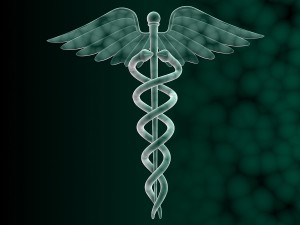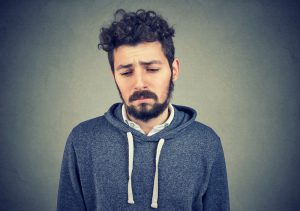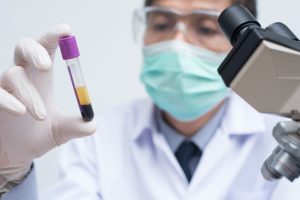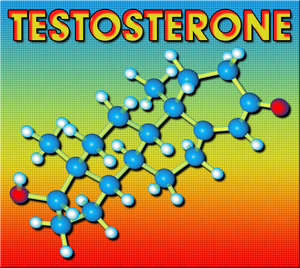Video Link: https://vimeo.com/294053275
Video Download: Click Here To Download Video
Video Stream: Click Here To Stream Video
Testosterone is a complex hormone that influences physical and psychological health in many ways. Most people are aware of the sexual effects of Testosterone Deficiency, such as impotence and lack of libido. Still, they aren't so aware of the variety of other issues that Testosterone Deficiency can cause.

Testosterone belongs to a class of hormones that are referred to as Androgens. These hormones are produced in both men and women but are produced in far greater quantities in males. Testosterone plays a role in maintaining the normal function of the body in a variety of ways.
Testosterone promotes muscle mass and physical strength, and it fosters sex drive and sexual ability. Testosterone is also a potent anabolic hormone, which means that it has a powerful effect on metabolism. Men naturally have less body fat than women, mostly because of Testosterone.
In addition to promoting sexual function and libido, Testosterone is also integrally crucial to the production of sperm and therefore regulates fertility. There is increasing evidence that Testosterone is also strongly correlated with a  positive psychological state in males.
positive psychological state in males.
Men with Low-T are more likely to experience depression and anxiety, and they are also more likely to be less confident and less willing to take sensible risks.
Testosterone Deficiency not only leads to symptoms of depression and anxiety in men but also in women. Because women don't produce nearly as much Testosterone as men, they can be more sensitive to the specific effects of Low-T, especially those associated with bone density.
What Causes Testosterone Deficiency?
There are some causes of Low-T, but they can all be organized into two particular categories—Primary Hypogonadism and Secondary Hypogonadism. Primary Hypogonadism refers to any cause of Low-T, which is the direct result of a malfunction of the Testes, which directly inhibits the body's ability to produce Testosterone. The following are some causes of Primary Hypogonadism:
- Cancer
- Testicular Trauma
- Mumps
- Excess Iron in the Bloodstream
Secondary Hypogonadism, on the other hand, refers to any form of Low-T, which is caused by systemic issues outside of the testes. The testes rely on signals from the Hypothalamus and Pituitary to produce Testosterone. If they do not adequately receive these signals, then the testes will not provide enough Testosterone to meet the needs of the body, despite being perfectly healthy. The following are some causes of Secondary Hypogonadism:
- Opiate Use
- Obesity
- Tuberculosis
- HIV/AIDS
- Aging
Out of all of the examples listed above, Testosterone Deficiency is most commonly the result of either Aging or Obesity. The body naturally loses its  ability to produce Testosterone over time. Some patients respond more severely to these changes than others.
ability to produce Testosterone over time. Some patients respond more severely to these changes than others.
Not everyone ends up needing Testosterone Therapy, but a medically significant number of men will end up struggling with their emotional, physical, and sexual vitality as a result of their declining Testosterone Production.
Obesity is a common cause of Testosterone Deficiency because obesity suppresses the body's natural production of Testosterone. Adipose fat cells can convert Testosterone directly into Estrogen, and the more body fat that a person has, the more Estrogen and Less Testosterone they will have in circulation.
Testosterone and Psychology
Testosterone Deficiency alters the psychological balance in many ways. Some changes are the natural result of declining energy levels and reduced metabolism. In contrast, other symptoms are a direct result of changes in neurological hormones that require a certain balance to maintain an optimal psychological state.
One psychological change clearly associated with Low-T and Andropause is reduced sex drive. As Testosterone Levels drop below a certain threshold, men often lose their interest in sex, often to their frustration and chagrin.
Other psychological symptoms associated with Testosterone Deficiency are irritability, anxiety, and depression. A recent study published by the International Journal of Endocrinology makes it clear that depression and Low-T  have a strong correlation, and there is also profound evidence that for men that simultaneously experience Low-T and Depression, Testosterone Replacement Therapy improves psychological balance and promotes health. This is particularly pronounced in elderly patients with very low Testosterone.
have a strong correlation, and there is also profound evidence that for men that simultaneously experience Low-T and Depression, Testosterone Replacement Therapy improves psychological balance and promotes health. This is particularly pronounced in elderly patients with very low Testosterone.
As men grow older as a result of 20th and 21st-century medical advances, this increases the importance of treating particular disorders. Because men are living longer on average in America than ever, more men are experiencing depression as a direct result of their age-related Testosterone Deficiency.
There is strong evidence that Testosterone Therapy of any means, whether it be Testosterone Creams, Patches, Injections, or other effective means, can relieve not only depression in aging men, but also can improve and enhance the overall quality of life. There is also evidence that Testosterone Therapy improves cognitive function, including memory and mental sharpness.
Diagnosing Depression Caused by Testosterone Deficiency
It's important to remember that there are many different causes of Depression, and Testosterone Deficiency is only one root cause. Unfortunately, many men don't reach out for the Testosterone Treatments that could benefit them, because they are under the impression that grouchiness and irritability are natural symptoms of aging, and don't associate those symptoms with those an underlying hormone disorder.
Luckily, it is straightforward to diagnose Testosterone Deficiency. If you contact a medical specialist, they can reveal your underlying hormone status just with a  routine physical and a blood test. If your Testosterone Levels are below 350 ng/dl, and you are experiencing symptoms such as depression and anxiety, in combination with other issues such as fatigue and changes in body composition, there is a real chance that you can benefit significantly from treatment.
routine physical and a blood test. If your Testosterone Levels are below 350 ng/dl, and you are experiencing symptoms such as depression and anxiety, in combination with other issues such as fatigue and changes in body composition, there is a real chance that you can benefit significantly from treatment.
If Testosterone Therapy alone is not able to improve your depression and anxiety, you may benefit from a psychological medication such as Lexapro or Celexa. If you feel that Testosterone is helping your health, you can also take both treatments simultaneously.
Testosterone Deficiency, Depression, and Women
Of course, women can also experience depressive symptoms resulting from Testosterone Deficiency. A study published in Maturitas provided strong evidence that Testosterone Deficiency can directly lead to symptoms of depression, as well as reduced libido and reduced sexual pleasure.
Women with Low-T often report pain during sex because their bodies are unable to become physically “ready” for sex. For women with Low-T during Perimenopause and Menopause, Testosterone is often prescribed to promote improved psychological and sexual health.
Should Men Turn to Testosterone for Depression?
Testosterone Deficiency is a severe medical condition, and it is becoming increasingly clear that Testosterone Therapy is a highly effective method to help aging men with Low-T feel more like their younger selves.
Depression, anxiety, and fatigue are real and significant symptoms that can really inhibit health and well-being, and Testosterone Treatments have helped millions of men overcome these feelings and improve their quality of life.
these feelings and improve their quality of life.
Of course, Testosterone Deficiency is not the only thing that can lead to depression, so it can benefit many men to combine Testosterone Replacement with Psychological Therapy, and, if Testosterone alone isn't enough to resolve psychological issues, other treatments may be concurrently prescribed to provide maximum benefit to the patient.
Contact Us Today For A Free Consultation

- Low Testosterone Treatments - Video [Last Updated On: December 21st, 2024] [Originally Added On: July 12th, 2012]
- Treating low testosterone - Video [Last Updated On: December 21st, 2024] [Originally Added On: July 12th, 2012]
- Fatigue and Low Testosterone part 2 - Video [Last Updated On: December 22nd, 2024] [Originally Added On: July 12th, 2012]
- Fatigue and Low Testosterone part 1 - Video [Last Updated On: December 22nd, 2024] [Originally Added On: July 12th, 2012]
- Nation + World [Last Updated On: January 22nd, 2018] [Originally Added On: September 10th, 2012]
- Natural Remedies - Natural Way to Promote Healthy Vitality in Men. [Last Updated On: May 19th, 2025] [Originally Added On: October 6th, 2012]
- ‘Horrendous’ Study Shows Obese Teen Boys Face Impotence and Infertility [Last Updated On: January 11th, 2018] [Originally Added On: October 17th, 2012]
- Symptoms of Low Testosterone Levels in Men - Video [Last Updated On: January 6th, 2025] [Originally Added On: November 2nd, 2012]
- Symptoms of Low Testosterone Levels with Dr. Alexander - Video [Last Updated On: January 6th, 2025] [Originally Added On: November 2nd, 2012]
- Bio-Identical Hormone Therapy [Last Updated On: January 7th, 2025] [Originally Added On: November 2nd, 2012]
- Low Testosterone and Male Fertility - Video [Last Updated On: January 7th, 2025] [Originally Added On: November 2nd, 2012]
- He's the one they call Dr Feel Good! - Video [Last Updated On: January 8th, 2025] [Originally Added On: November 2nd, 2012]
- Get the down low on Low T - Video [Last Updated On: January 8th, 2025] [Originally Added On: November 2nd, 2012]
- Low Testosterone Quiz - Video [Last Updated On: January 9th, 2025] [Originally Added On: November 2nd, 2012]
- Female sex-enhancing nasal spray undergoing clinical trials [Last Updated On: October 24th, 2015] [Originally Added On: November 2nd, 2012]
- More Men Suffering from Low Testosterone [Last Updated On: May 28th, 2025] [Originally Added On: November 7th, 2012]
- obese men lose weight with testosterone - Video [Last Updated On: January 23rd, 2025] [Originally Added On: November 7th, 2012]
- Bodybuilding Tip Testosterone Boosters to Build Muscle Do They Work - Video [Last Updated On: January 24th, 2025] [Originally Added On: November 9th, 2012]
- Male Pattern Baldness - Video [Last Updated On: January 27th, 2025] [Originally Added On: November 12th, 2012]
- Bio-Identical Hormone Replacement Men and/or Women - Video [Last Updated On: February 3rd, 2025] [Originally Added On: November 22nd, 2012]
- LEARNING ABOUT TESTOSTERONE LEVELS - Video [Last Updated On: February 4th, 2025] [Originally Added On: November 22nd, 2012]
- Salivary diagnostics [Last Updated On: February 11th, 2025] [Originally Added On: December 4th, 2012]
- Natural Hormone Repalcement Therapy [Last Updated On: February 19th, 2025] [Originally Added On: December 10th, 2012]
- Why You Should Help Others Fight -Major Depression, Anxiety, Depersonalization, Low Testosterone- - Video [Last Updated On: January 7th, 2013] [Originally Added On: January 7th, 2013]
- Effects Of Low Testosterone | Low T Hormones - Video [Last Updated On: February 14th, 2013] [Originally Added On: February 14th, 2013]
- Go7Herbal Why Men Are Having Low Testosterone And High Estrogen - Video [Last Updated On: February 18th, 2013] [Originally Added On: February 18th, 2013]
- Vegan Blood Test - I'm Diabetic, Obese, and Low Testosterone - Video [Last Updated On: February 23rd, 2013] [Originally Added On: February 23rd, 2013]
- Vegan for 12 years. Diabetic, Obese, Low Testosterone, Hyperkalemic and out of shape? - Video [Last Updated On: February 26th, 2013] [Originally Added On: February 26th, 2013]
- Low testosterone in men-Have your testosterone checked for free. See below for details. - Video [Last Updated On: March 7th, 2013] [Originally Added On: March 7th, 2013]
- Low Testosterone (Lunch with the Doctor) February 2013 - Video [Last Updated On: March 8th, 2013] [Originally Added On: March 8th, 2013]
- Being aware of low testosterone - Video [Last Updated On: March 23rd, 2013] [Originally Added On: March 23rd, 2013]
- Low Testosterone, or so I thought. - Video [Last Updated On: April 9th, 2013] [Originally Added On: April 9th, 2013]
- Haas Psychiatric Wellness - Low Testosterone - Video [Last Updated On: April 20th, 2013] [Originally Added On: April 20th, 2013]
- low testosterone linked to future ra - Video [Last Updated On: May 19th, 2013] [Originally Added On: May 19th, 2013]
- www.YourTScore.com Importance of Testing for Low Testosterone by Dr. Tammy Tucker - Video [Last Updated On: May 24th, 2013] [Originally Added On: May 24th, 2013]
- Low testosterone= Low Sex Drive - Video [Last Updated On: June 15th, 2013] [Originally Added On: June 15th, 2013]
- The Chicken or the Egg: Which Comes First, Diabetes or Low Testosterone in Men? - Video [Last Updated On: July 2nd, 2013] [Originally Added On: July 2nd, 2013]
- Dr. DiPiazza Updates Low Testosterone - Video [Last Updated On: July 8th, 2013] [Originally Added On: July 8th, 2013]
- About Low Testosterone and Treatment - Video [Last Updated On: July 16th, 2013] [Originally Added On: July 16th, 2013]
- SHC Video 12 Low Testosterone - Video [Last Updated On: July 18th, 2013] [Originally Added On: July 18th, 2013]
- Anti Aging Costa Rica - What is LowT? ( What is Low Testosterone? ) and Anti-Aging Costa Rica - Video [Last Updated On: May 4th, 2015] [Originally Added On: July 18th, 2013]
- The Doctor is In: Low testosterone - Video [Last Updated On: July 28th, 2013] [Originally Added On: July 28th, 2013]
- How Is Low T Or Low Testosterone Diagnosed? By Low T Expert Dr David Asher In Orange County CA - Video [Last Updated On: August 7th, 2013] [Originally Added On: August 7th, 2013]
- Low T Or Low Testosterone Introduction By Low T Expert Dr David Asher MD in Anaheim - Video [Last Updated On: August 7th, 2013] [Originally Added On: August 7th, 2013]
- Low T Or Low Testosterone Quiz With Dr David Asher MD in Anaheim OC Orange County - Video [Last Updated On: August 7th, 2013] [Originally Added On: August 7th, 2013]
- Low T Quiz With Low Testosterone Expert Dr David Asher MD in Anaheim CA VIDEO - Video [Last Updated On: August 10th, 2013] [Originally Added On: August 10th, 2013]
- Diet soda vs. regular; low testosterone: Healthy Living [Last Updated On: March 17th, 2025] [Originally Added On: August 14th, 2013]
- Natural Cure For Low Testosterone Helps To Boost Health And Vitality - Video [Last Updated On: August 18th, 2013] [Originally Added On: August 18th, 2013]
- Natural Herbal Remedies For Low Testosterone Help To Improve Sex Drive In Men - Video [Last Updated On: August 18th, 2013] [Originally Added On: August 18th, 2013]
- Build up your keywords low testosterone, Tyler-Longview Texas - Video [Last Updated On: September 2nd, 2013] [Originally Added On: September 2nd, 2013]
- Build up your low testosterone, Tyler-Longview Texas - Video [Last Updated On: September 2nd, 2013] [Originally Added On: September 2nd, 2013]
- Low Testosterone - Clinical Research Study - Video [Last Updated On: September 6th, 2013] [Originally Added On: September 6th, 2013]
- low estrogen vs low testosterone in men - Video [Last Updated On: September 18th, 2013] [Originally Added On: September 18th, 2013]
- Low Testosterone Treatment with Frisco Family Physician Dr. Bradley Friedman - Video [Last Updated On: September 26th, 2013] [Originally Added On: September 26th, 2013]
- Herbs for low testosterone - Video [Last Updated On: October 4th, 2013] [Originally Added On: October 4th, 2013]
- Food Items To Treat Low Testosterone Problems - Video [Last Updated On: October 5th, 2013] [Originally Added On: October 5th, 2013]
- 5 Natural Ways To Treat Low Testosterone - Video [Last Updated On: October 8th, 2013] [Originally Added On: October 8th, 2013]
- How low testosterone could be deadly - Video [Last Updated On: October 23rd, 2013] [Originally Added On: October 23rd, 2013]
- Low T Treatment | Low Testosterone Treatments | Low Testosterone ... [Last Updated On: January 26th, 2018] [Originally Added On: November 2nd, 2013]
- Is it Low T | Signs, Symptoms, and what you can do about Low T [Last Updated On: December 7th, 2017] [Originally Added On: November 3rd, 2013]
- enVoqueMD talks low testosterone, how to increase levels - Video [Last Updated On: November 3rd, 2013] [Originally Added On: November 3rd, 2013]
- Low Testosterone Causes Fatigue - Video [Last Updated On: November 5th, 2013] [Originally Added On: November 5th, 2013]
- Something Every Man Needs to Know - Video [Last Updated On: November 6th, 2013] [Originally Added On: November 6th, 2013]
- Low Testosterone - WebMD: Symptoms, Health Effects, and ... [Last Updated On: December 2nd, 2017] [Originally Added On: November 12th, 2013]
- Low Testosterone (Low T) Levels in Men, Women, Symptoms - OnHealth [Last Updated On: December 1st, 2017] [Originally Added On: November 12th, 2013]
- Low Testosterone (Low T) Symptoms, Causes, and Treatment [Last Updated On: March 26th, 2020] [Originally Added On: November 12th, 2013]
- Low T Treatment | Low Testosterone Treatments | Low ... [Last Updated On: January 13th, 2018] [Originally Added On: November 18th, 2013]
- Is it Low Testosterone? [Last Updated On: January 5th, 2018] [Originally Added On: November 21st, 2013]
- Testosterone Pills For Men [Last Updated On: March 29th, 2025] [Originally Added On: November 23rd, 2013]
- Testosterone: Indications, Side Effects, Warnings - Drugs.com [Last Updated On: December 28th, 2017] [Originally Added On: December 2nd, 2013]
- Low Testosterone (Low-T) Symptoms, Causes, Treatment - What ... [Last Updated On: December 3rd, 2017] [Originally Added On: December 3rd, 2013]
- Low Testosterone in Women - Video [Last Updated On: December 6th, 2013] [Originally Added On: December 6th, 2013]
- Quack Medicine? A Push to Sell Testosterone Gels Is Not Without Major Side Effects [Last Updated On: April 4th, 2025] [Originally Added On: December 14th, 2013]
- Gym Time - Video [Last Updated On: December 19th, 2013] [Originally Added On: December 19th, 2013]
- Low Testosterone and Your Health - WebMD Men's Health Center ... [Last Updated On: January 30th, 2018] [Originally Added On: December 21st, 2013]
- Low testosterone signs, symptoms and treatments Dr Sam Chawla by Test X180 Ignite - Video [Last Updated On: January 2nd, 2014] [Originally Added On: January 2nd, 2014]
- Low Testosterone Symptoms In Men - Video [Last Updated On: January 3rd, 2014] [Originally Added On: January 3rd, 2014]
- Hormone therapies help older adults find new life [Last Updated On: December 8th, 2017] [Originally Added On: January 8th, 2014]
- HORMONES DECREASE AS PEOPLE AGE, BUT REMEDIES HELP OLDER ADULTS FIND NEW LIFE [Last Updated On: January 10th, 2018] [Originally Added On: January 8th, 2014]
- Accumed Research Associates Featured On Katz's Corner 77 WABC Radio Show To Discuss Enlarged Prostate Treatment and ... [Last Updated On: January 7th, 2018] [Originally Added On: January 13th, 2014]
Word Count: 1172




















